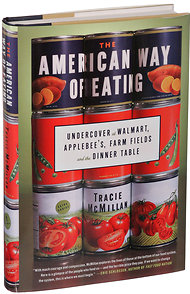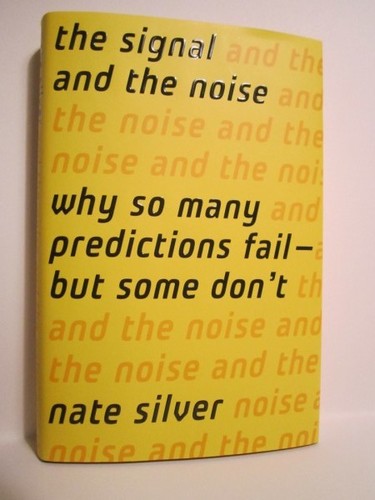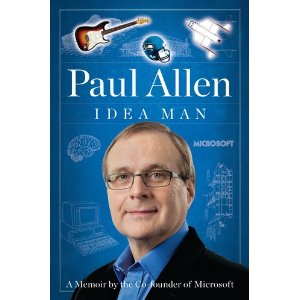"What would it take for us all to eat well?”
A simple enough question on the surface. But think a little bit longer about the question and how in America should we go about improving the quality and variety of our diets, expand the access to good, fresh food for people living in decaying inner cities, and somehow begin to understand why and how that the problem of obesity and its associated health concerns continue to escalate, well all of a sudden you will realize that finding an answer is a much larger and more complex proposition. 
"What would it take for us all to eat well? "
That is the question that author The American Way of Eating author Tracie McMillan sets out to answer when she begins her year-long sojourn along the front lines of the food industy - as a farmworker in the grape vineyards and garlic fields of the Central Valley of California, at two different stops working grocery and later produce in Detroit-area Walmarts, (did you know that Walmart is the nations' largest food retailer?), and finally inside the kitchen at a Brooklyn Applebee's, where in America's most popular sit-down restaurant, meals are more assembled from pre-made components, than actually cooked.
Along the way, Ms. McMillan alternates the story of her experiences as a bottom of the labor food chain with a deeply researched and revealing look at the rights, (or lack thereof), of the farmworkers, the development of and eventual power over the nation's food supply of the supermarket industry in the United States, and the growing share of restaurant eating that has come to claim in the average American's diet. And what we learn, via her first-hand experiences and her in-depth reporting makes us uncomfortable. Ms. McMillan plainly states the rights of the typical farmworker coolly and succinctly -
"Under federal labor laws, I have no rights to days off; I have no right to overtime pay; I have no right to collective bargaining."
The farmwork is as we'd expect - exceedingly hard, mundane, dangerous,and incredibly poorly paid. And similar to the Apple/Foxconn situation that has been so widely reported recently, the labor costs of farmworkers contribute a tiny fraction, about 6%, of the product's eventual retail price. But unlike one of the 'protests' consumers can bring to bear over the Apple situation, simply withholding the purchase of new gadgets until Apple improves working conditions, won't work when the product is real apples, (or lettuce or garlic or peaches).
From the fields of California and the front lines of production, Ms. McMillan ventures into the front lines of food retailing, and recounts two separate stints as a stock person at Walmart supercenters. Here we learn about Walmart's incredible power and influence over the local produce supply and quality in markets where it dominates, the lengths to which Walmart will go to save the salability of its produce, (hint, don't buy any lettuce that is visibly smaller than the rest of the lot), and the challenges faced by the generally good-natured and well-intentioned workers. The key metric about Walmart, stated plainly on p. 138 -
Walmart's share of our food supply grew at an unparalleled pace; at 22 percent, it now sells more than twice as much as the next three largest stores combined.
McMillan accurately compares Walmart's rise as a mega-retailer is analogous to the rise of the mega-farms. As in retail where many towns have few choices about where to shop for fresh produce, chances are good that produce was grown on one of the 6% of farms that supply 75% of farm sales in the United States. Larger farms, feeding larger distribution networks, stocking supercenter stores, most located in the suburbs, where space for stores, parking, and affluent shoppers determine retail location choices.
From Walmart, Ms. McMillan joins the kitchen staff as a food expediter at a busy Applebee's location in Brooklyn. Here we learn that 'cooking' is not what really happens at Applebee's, rather it's a controlled chaos of food assembly, from mostly pre-cooked, pre-measured, and frozen component parts. And while the staff and management come off as mostly friendly and supportive an end of the book McMillan is sexually assaulted while sleeping and after being drugged during a farewell party with fellow Applebee’s workers.
The American Way of Eating is certainly a book about food, but just as much it is a book about economics, corporate America, and the kind of work that millions of people do every day, and that many of us are more comfortable not thinking about too much. Farmwork, life as a minimum wage, part-time, no benefits retail worker, as an exhausted and overworked kitchen assistant - these jobs are not only hard to do, they are hard to survive doing. McMillan repeatedly faces struggles making ends meet, and often it is only the kindness of newly made friends on the food front lines that help see her through.
By the end of the book, you are forced to think about all the ways we need to do better. Farmworkers should be treated better. Walmart and other mega-stores should open locations in the food deserts of places like Detroit, and we should do more as a society to think of food like we think about electricity or clean water - as a social good, not a luxury item.
"What would it take for us all to eat well?”
The determination and commitment to re-think how food is grown, harvested, marketed, and sold.
Easy and incredibly hard at the same time.
The American Way of Eating is a fascinating, challenging, and important book, that I strongly recommend.
THE AMERICAN WAY OF EATING
Undercover at Walmart, Applebee’s, Farm Fields and the Dinner Table
By Tracie McMillan
319 pages. Scribner. $25


 Steve
Steve



